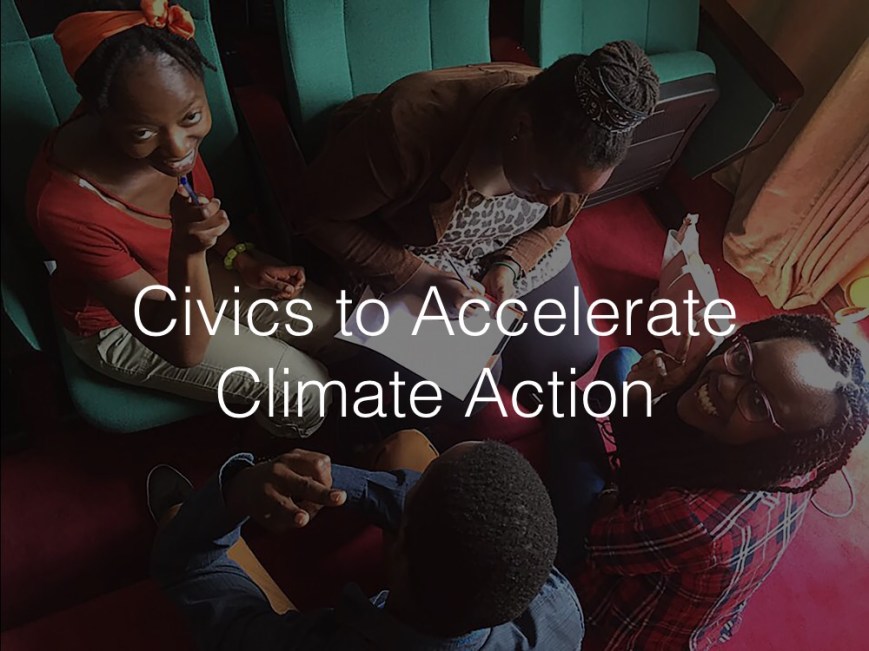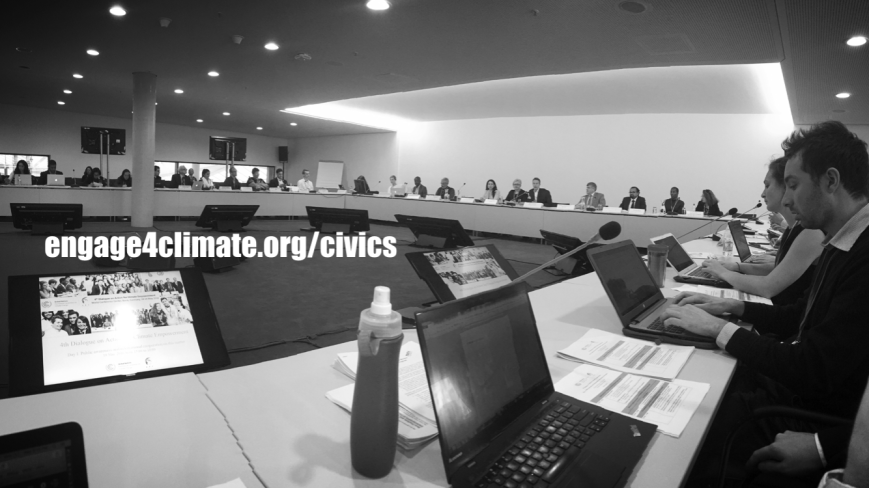 ACE is the interactive agenda for implementation of Article 6 of the UN Framework Convention on Climate Change. Article 6 requires all nations that are Parties to the Convention to provide resources for building awareness, local capability, information sharing and ongoing engagement.
ACE is the interactive agenda for implementation of Article 6 of the UN Framework Convention on Climate Change. Article 6 requires all nations that are Parties to the Convention to provide resources for building awareness, local capability, information sharing and ongoing engagement.
 |
 |
 |
GLOBAL ONLINE POLICY FORUM: ACTIONABLE CLIMATE CIVICS
Climate civics is any activity that empowers citizens, communities, and political decision-makers to work together to design and to live a smarter climate future. We will be focusing in this Global Online Policy Forum on ways of turning Action for Climate Empowerment into both an expansion of the global civic space and real and measurable action to reduce the threat of climate change and build value at the human scale.
- Friday, 27 May 2016, at 11:00 am NYC / 5:00 pm Bonn / 8:30 pm Delhi
- Check for start time in your time zone
- Join via Fuze at http://fuze.me/32853850
- RSVP at the event page on Facebook
Civics to Accelerate Climate Action
By involving people and communities in the design of policy priorities and implementation strategies, we can achieve a more diverse and adaptive curation of best practices, so we have better information about local needs, capabilities and actions, and always-active opportunities for raising ambition. By opening the process of breakthrough innovation to more minds, and by connecting more people to the smartest proposals and processes, we can succeed faster together.
If the overall effort is ultimately what it should be, then Indonesian tribal villagers, university students in Jakarta, United States Senators, Inuit communities living above the Arctic Circle, and scientists running the global seed bank in Svalbard, along with everyday people from anywhere, can all act as peers in a web of insight that helps all of us to make our best practices better and to accelerate the pace at which we build a climate-smart future.
Click here to read the full article.
Input to Consultations on Article 6 of the Convention
We see four key concepts and actionable priorities as central to success of UNFCCC Article 6, Paris Agreement Article 12, the universalizing of serious, ongoing engagement, and to the success of a timely global transition:
- Citizen participation in national, regional, and global processes
- ACE platform for active collaboration and mutual empowerment among non-party actors engaging citizens
- Universal stakeholder status, as under the Aarhus Convention
- Principle of mutual education (governments to citizens, and citizens to governments)
Click here for the full submission.
Proposal for Intermediate review of the Doha Work Programme
on Article 6 of the Convention
The Intermediate Review of the Doha Work Programme on Article 6 allows for submissions from civil society observers, recommending changes to process, function or funding of initiatives, including the expansion or change of definitions relating to the work of building awareness, local capability, information sharing and ongoing engagement. Our submission lays out the reasoning, and the support structure for establishing a worldwide open, collaborative Citizens’ Climate Engagement Network, rooted in meetings hosted locally in line with the Toolkit for local working sessions.
Click here for the full submission.
Toolkit for Local CCEN Meetings
Our Toolkit for Local Meetings allows anyone anywhere to get into active working sessions that will bring citizens’ voices into the policy process. This process is open, flexible, and allows for genuinely local leadership, while reinforcing the principle of mutual education, with an emphasis on knowledge, impacts, capacity, and ongoing substantive engagement at the human scale.
Participation Workstream
Insight and outcomes from local working sessions feed into a series of global thematic Workstreams, which ensure actionable engagement and local genius make their way into the global process. Our Participation Workstream is an always active venue for collaboration on ACE strategies and expansion of the global civic space.



You must be logged in to post a comment.